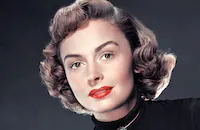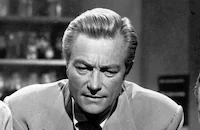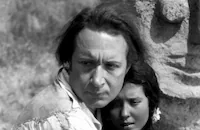Hangman's Knot

Brief Synopsis
Cast & Crew
Randolph Scott
Donna Reed
Claude Jarman Jr.
Frank Faylen
Glenn Langan
Richard Denning
Film Details
Technical Specs

Synopsis
In late spring 1865, in Nevada, a small group of Confederate soldiers still under orders and disguised as civilians, intercept a gold shipment escorted by Union cavalry troops. After a furious battle in which both sides suffer losses, Confederate major Matt Stewart discovers from a dying Union officer that the war ended a month earlier. Doubtful, Matt takes the gold as planned to the scheduled rendezvous with Capt. Petersen, who has been scouting the area disguised as a traveling peddler. Discovering that Petersen knew of the surrender and purposely chose not to tell the men, hot-headed Rolph Bainter kills him. The men debate what to do with the gold and as Matt is the ranking officer, he decides they will take it back to the South for reconstruction aid. The next day, Matt drives Petersen's covered wagon with the men and gold hidden inside. They are soon stopped by a posse looking for the gold thieves, but Matt misdirects them. Later when the mules bolt from the wagon, the men are forced to take over a stagecoach, whose passengers include former Union war nurse Molly Hull and beef contractor Lee Kemper. The posse, actually a group of renegades led by Quincey, return and chase the stage to a way station. The posse captures one of Matt's men, Cass Browne, and drags him to discover the location of the gold, while Matt holds the stage passengers and aging station guard Plunkett and his daughter, Margaret Harris, hostage. Molly reluctantly tends to one of the wounded men at Matt's request. When Kemper accuses Matt and his men of having murdered all of the Yankee Volunteers, Matt explains the truth about the gold. Embittered over the loss of her husband and son in the war, Margaret remains implacable while Molly and Kemper are suspicious. The renegades surround the station and Matt tries to convince them that the gold is hidden near the abandoned wagon. As night descends, Matt elicits promises from each of the hostages to remain silent while he and the men slip out in the dark, but Kemper breaks his word and the men are forced back into the station. Although Matt keeps Rolph from killing Kemper, he gags Kemper. The renegades try to lure Matt out by threatening to hang Cass, but Matt uses the remaining sticks of dynamite from their ambush to distract the posse and rescues Cass. The following day, when Kemper is ungagged for water, he offers Matt a way out in exchange for two bars of gold. Kemper gives Matt an Indian token and explains he has a trading relationship with a local tribe of Paiute Indians and the token will ensure fresh horses and safe passage out of the territory. Kemper also insists a rainstorm is on the horizon, which will supply Matt and the men cover. Matt agrees to the plan. As another night falls, Quincey and one of his men begin digging a short tunnel under the station. Rolph tries to force himself on Molly as she is sitting with the wounded man, which enrages Matt, and the two men have a fistfight. Afterward when Matt consoles Molly, Rolph is angered and tries to shoot Matt. Jamie Groves, the youngest and least experienced of the men, shoots the gun out of his hand and when Rolph tries again, Jamie kills him. Just then Quincey and his man reach the trap door, but Cass stops them from entering. Frustrated, Quincey decides to burn down the station and when one of his men tries to leave, shoots him. As the fire burns through the roof, a thunderstorm breaks out. Kemper panics and flees outside, only to be shot by the renegades. Cass sneaks outside to scatter the posse's horses, but is also killed. As Matt and Jamie prepare to flee, Molly begs Matt not to take the gold. Outside, the storm confuses Quincey and his men, who begin shooting at one another. Believing Matt has escaped with the gold, Quincey races after him. The next morning, Matt and Jamie realize the renegades are dead or gone. Matt surrenders the gold to Plunkett, and he and Jamie promise to return to Molly, Margaret and Plunkett after they are repatriated in Virginia.

Cast

Randolph Scott

Donna Reed

Claude Jarman Jr.
Frank Faylen
Glenn Langan

Richard Denning

Lee Marvin
Jeanette Nolan

Clem Bevans

Ray Teal

Guinn "big Boy" Williams

Monte Blue
John Call
Reed Howes
Edward Earle
Post Park
Frank Hagney
Frank Yaconelli
Crew
Mischa Bakaleinikoff
George Brooks
Harry Joe Brown
Yakima Canutt
Jack Corrick
Francis Cugat
Frank Goodwin
Gene Havlik
Roy Huggins
Charles Lawton Jr.
Randolph Scott
Herbert Stewart
Frank [a.] Tuttle

Film Details
Technical Specs

Articles
Hangman's Knot
Hangman's Knot was the perfect vehicle for Scott to develop his onscreen persona as a man of honor challenged by complicated times, miscommunication and the liquid loyalty of those around him. The filmmakers made it easy for audiences to support Scott's conflicted Major Matt Stewart by surrounding him with such dyed-in-the-wool shitheels as Ray Teal (as the leader of the faux posse), Glenn Langan (as the comrade who sends Stewart after the gold shipment while knowing full well that the war is over), Richard Denning (in tight-assed coward mode) and a scar-faced Lee Marvin (as the least reliable of Stewart's men) while offering support and sympathy from the amicable likes of Yankee nurse Donna Reed (a year from her Oscar® win for Fred Zinnemann's From Here to Eternity, 1953), rebel soldier Frank Faylen and The Yearling (1946) costars Clem Bevans and Claude Jarman, Jr. The lunar desertscapes of Lone Pine, California, and the Corrigan Ranch stood in for the film's Nevada Territories setting although a considerable amount of the film's running time takes place within the cramped confines of a mountain stagecoach way station. Producer Harry Joe Brown would return to the conceit of Confederate soldiers on the run in his last film, A Time for Killing (1967), directed by Phil Karlson, while the plot point of infantrymen soldiering on in ignorance of the South's surrender at Appomattox was an inciting event also in Andrew V. McLaglen's The Undefeated (1969).
The complication of ill-gotten gains causing the dissolution of a tight-knit group urges Hangman's Knot closer to the categorization of crime genre. This should come as no surprise given that the film was scripted and directed by Roy Huggins. The Washington State-born novelist taught himself the craft of mystery writing by copying out the entire text of Raymond Chandler's Farewell My Lovely by hand. He came to Hollywood when Columbia bought the rights to his first novel, The Double Take, which he adapted as I Love Trouble (1948); years later, Huggins would repurpose star Franchot Tone's detective Stuart Bailey as the protagonist of the ABC series 77 Sunset Strip (1958-1964). Huggins also authored the hard-bitten screenplays for Too Late for Tears (1949), adapted from his 1947 novel, and Pushover (1954) with Fred MacMurray. A friendly HUAC witness in 1952, he left film for the expanding medium of television and never again directed a feature film. For the small screen, he created such popular series as Maverick (1957-1962), The Fugitive (1963-1967) and The Rockford Files (1974-1980). Huggins also created the short-lived Depression era detective series City of Angels (1976) and executive produced and wrote episodes of Toma (1973-1974), Baretta (1975-1978) and Hunter (1984-1991). A 1991 recipient of the Private Eye Writers of America Lifetime Achievement Award, Roy Huggins died in April 2002, at the age of 87.
Producer: Harry Joe Brown
Director: Roy Huggins
Screenplay: Roy Huggins
Cinematography: Charles Lawton, Jr.
Art Direction: George Brooks
Film Editing: Gene Havlick
Cast: Randolph Scott (Major Matt Stewart), Donna Reed (Molly Hull), Claude Jarman, Jr. (Jamie Groves), Frank Faylen (Cass Browne), Glenn Langan (Capt. Petersen), Richard Denning (Lee Kemper), Lee Marvin (Rolph Bainter), Jeanette Nolan (Mrs. Margaret Harris), Clem Bevans (Plunkett, the Station agent), Ray Teal (Quincey).
C-80m.
by Richard Harland Smith
Sources:
Randolph Scott: A Film Biography by Jefferson Brim Crow III (Empire Publishing, 1994)
Donna Reed: A Biblio-Biography" by Brenda Scott Royce (Greenwood Press, 1990)
A Pictorial History of Westerns by Michael Parkinson and Clyde Jeavons (The Hamlyn Publishing Group, Ltd., 1972)
Roy Huggins obituary by Dennis McLellan, Los Angeles Times, April 2, 2002

Hangman's Knot
Quotes
Trivia
Notes
The working title for this film was The Outlanders.















